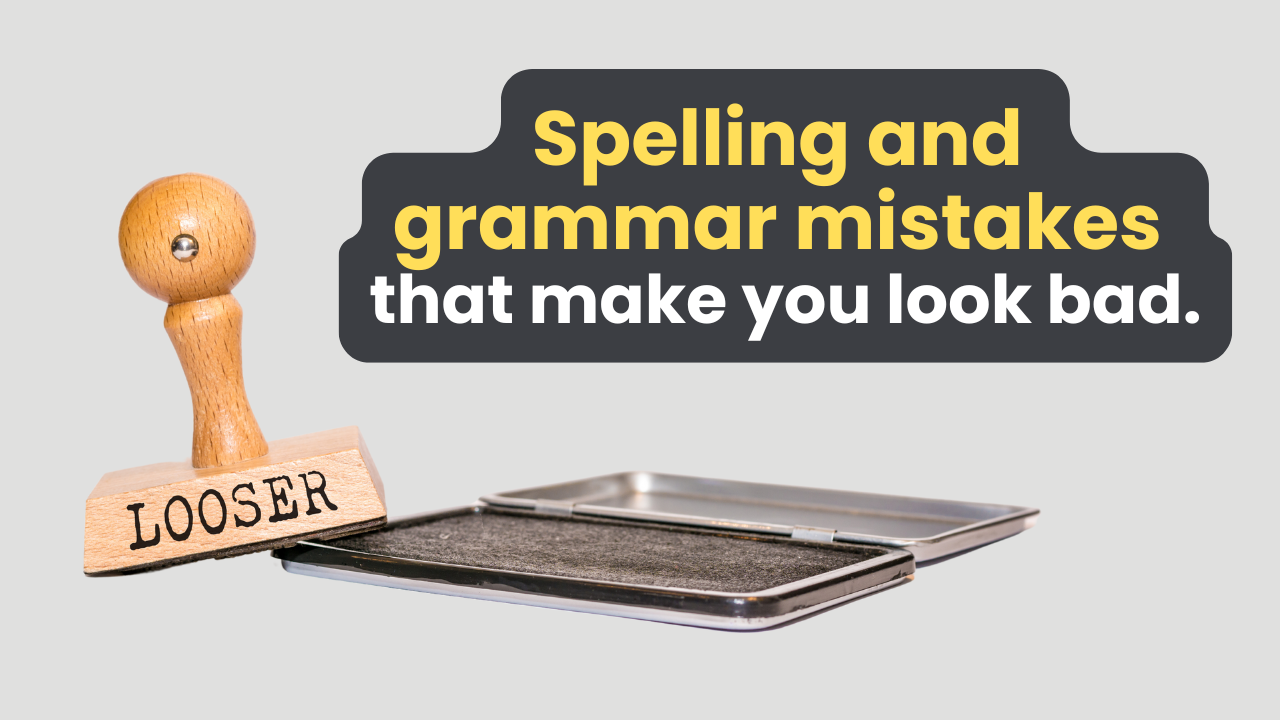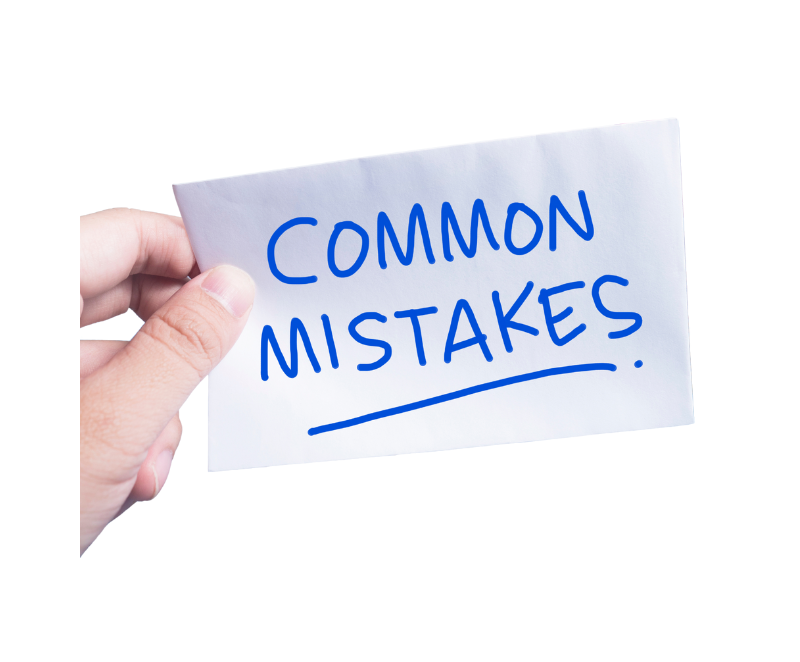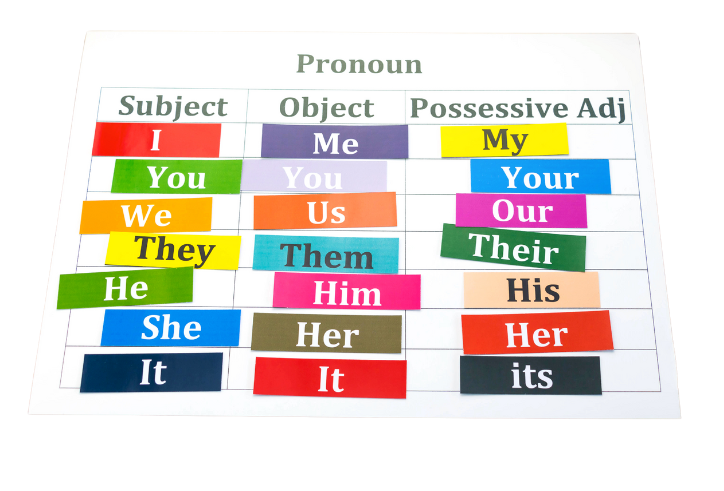
Here are some spelling and grammar mistakes that could cost you a job.
The truth is that poor spelling and grammar can destroy a professional image in a moment. You might argue that it's not fair to judge people on grammar and spelling, especially if it's not really pertinent to their job.
But when you are competing for attention and building credibility in your career, how your materials and written communication look and read definitely matters.

As a former executive recruiter and lifetime resume fanatic, I have learned that the best resumes are "frictionless."
That means that everything is designed so the reader can smoothly and quickly scan for key information they're looking for, and it easily sinks in, and it's an easy experience.
It all makes sense and is easy to understand because there's nothing to slow them down or confuse them.
 This is critical when your resume reaches a human reader.
This is critical when your resume reaches a human reader.
Studies show you have 7.4 seconds to impress the reader so they decide to consider you further, so you want them to quickly see what they need, or they will move along.
And you can lose your reader in a split second.
It could be a typo, a misspelled or misused word, an unfamiliar acronym, hard-to-decipher dense text, or buzzwords or technical terms. Or it could be a confusing design choice or awkward formatting.
I call these things "stoppers" because they can stop a reader from following along with your story.
 A stopper interrupts attention and, in that liminal moment, instead of continuing to review your resume, part of their brain has been distracted and is now thinking "wait... what does AXIW stand for? "or "is it really okay to spell out the word OK like that?" or "is that an actual job title?"
A stopper interrupts attention and, in that liminal moment, instead of continuing to review your resume, part of their brain has been distracted and is now thinking "wait... what does AXIW stand for? "or "is it really okay to spell out the word OK like that?" or "is that an actual job title?"
You may have just done the same thing reading this.... stopped reading for a second while part of your brain stopped to consider those questions, too.
Your brain shifted its attention to take a moment to process what it was reading, and in that instant, it stopped reading.
That's a stopper.
And you want to avoid stoppers because that might be the moment you lose them.
Your goal is to keep your reader engaged as long as you can.
A misspelling or grammatical error may also be a dealbreaker.
Certainly, not everyone cares about spelling and grammar, but the ones who do, really do, and those people are often the senior people who make decisions.
 Don’t lose an opportunity over a simple spelling or grammar mistake that you can easily avoid.
Don’t lose an opportunity over a simple spelling or grammar mistake that you can easily avoid.
Just find a system or a memory trick that will help you remember, like word association, or a silly song or rhyme you make up, or a make a little cheat sheet you always keep tucked into your wallet.
These are some common spelling and grammatical errors I see in emails, cover letters and  resumes, online media and publications, and in conversations.
resumes, online media and publications, and in conversations.
Tip: If you know you sometimes make these errors, make yourself a little card-sized cheat sheet of the words to remember and keep it in your wallet for easy reference.
Your / You're
An apostrophe in the middle of a word tells you that it’s a contraction that shortens two words into one, and one or more letters is missing.

“You’re” is a contraction of "you” + “are.”
But "your" and “yours” means it belongs to you, as in "that's your coat."
- you're = the shortcut for "you are"
- your / yours = belonging to you
You're going to love your new job!
They're / Their / Theirs / There
This gets more complicated because there are different kinds of words here.
"They're" is a contraction of "they + are," just like “you’re” and “it’s."
"Their" and “theirs” means belonging to them, just like "your" and "yours."
"There" which refers to a place, which is easy to remember when you notice the word "here" part of the word “there”, which is also a place.
- they're = they are
- their / theirs = belonging to them
- there = a place
They're looking for their book. The book is theirs. Please put it over there.
They're going to miss their teachers when they leave there, but the future will be theirs.
It’s / Its
The it’s/its confusion happens because apostrophes often show ownership ("Did you see Joe’s new car?"). But not in this case.
It’s is the contraction of it + is. When in doubt, just read it as two words, it is, and see if it makes sense, and if it does, it’s is correct.
Its is possessive just like his and hers, meaning belonging to it. No apostrophe needed.
- • It’s = the contraction of it is, with the aprostrophe showing something is missing
- • Its = possessive, meaning ‘belonging to it’ (just like his, her, hers, ours and theirs)
It’s a great feeling when the company names you one of its top performers.
The leopard doesn't change its spots and it's always a good idea to pay attention.
Loose / Lose
English is weird, and these words prove it. These spellings don’t make much sense, so it’s not your fault if you have a hard time with it, but you still have to remember the difference.

- Loose = opposite of tight, rhymes with goose (think loosey goosey)
- Lose = the opposite of win, and rhymes with booze, shoes and cruise (compare those four different spellings for these rhyming words... English is so weird, isn't it?)
To see just how weird English is, compare another pair of words: choose and chose. They‘re spelled the same as loose and lose except the initial sound, of 'l' or 'ch' but the pronunciations are entirely different.
Seriously, it doesn’t seem logical. No wonder so many people get it wrong.
My pants are too loose… did I lose weight?
The loose interpretation of the regulation may cause the company to lose $100,000.
Lead / Led
This word pair comes up a lot in resumes where you talk about projects you oversaw or managed.
• Lead = in front or in charge, present tense, rhymes with “deed”
• Led = in front or in charge, past tense, rhymes with “bed”
• Lead = what’s in a pencil (which is actually graphite), and, confusingly, also rhymes with “bed” (again, English is weird)
In the past, she led the company’s efforts to reduce the amount of lead in paints, and now she has been asked to lead the new safety department.
A lot / Alot / Allot
The bad news first...there is no such word as "alot."
"A lot" refers to a large quantity, a group of things being sold together, or a piece of land.
"Allot "means to distribute, allocate or parcel out.
- Alot = not a word, nope
- A lot = a large quantity
- Allot = distribute or allocate
When you allot the budget for next year, we are going to need a lot of money for the new project.
You and I / You and Me
Here's one that is both a spoken and written grammatical error, and it's widely misused, even by TV news anchors and journalists, who should know better. It's about pronouns, not spelling.
In English, we use different pronouns for the subject or the object of a sentence.
Those subject/object pronoun pairs are I/me, you/you, she/her, he/him, we/us, they/them.
- Pronouns for the subject of a sentence = I, you, she/he, we, they.
- Pronouns for the object of a sentence = me, you, her/him, us, them.
As we learn to speak English, it soon becomes second nature for us to know which pronoun is correct.
A fluent English speaker would never say "me love she" instead of "I love her" and would never say "him hired they" instead of "he hired them."
And if you thought your friend and another person, had a secret, you’d say "there is a secret between them” and it would be super-weird if you said “there’s a secret between they.” Am I right?
And you’re not likely to say “her did a great job” or “them will be home early” or "I'll leave the decision to you and they."
When it comes to subject/object pronouns, we rarely make mistakes...
...except for certain phrases including "between you and I" and "between you and me."
Two easy ways to check which subject/object pronouns are right:
1. Try leaving out the "you and..." part to see how it sounds.
If you aren't sure if you should say "he gave the invitation to you and I," just drop the "you and" words -- so it now that would say "he gave the invitation to I. " That's clearly not right. Now you know the subject pronoun doesn't work.
2. Group "you" and "I" or "you and me" together into either "we" or "us" and see which works.
Test the sentence "he gave the invitation to "you and I" by replacing "you and I" with "we" (which is the subject plural pronoun) and you will get "he gave the invitation to we." That can't be right, so then try replacing it with the subjective pronoun with "us" to get "he gave the invitation to us" and you know that's the one.
Between you and me (us), here are a few secrets to how you and I (we) can learn to write better. My brother and I (we) have an rivalry to see if mom likes him or me (us) best.
And remember, I’m talking about business correspondence here, where spelling and grammar can be expected to matter. But they can be less important elsewhere.
For instance, in texting and messaging, typos are rampant and shorthand is common.
And in personal correspondence, anything goes… you be you. I don't even use capital letters when I'm typing personal emails.
But in a job search and in business communications, the standards are high and even small things matter when you are competing for a job you want and trying to make a good impression (which for ambitious people means all the time).
"So between you and I, if you're writing includes allot of these mistakes, know that hiring managers have there standards, and it's possible that errors like these may have lead to you loosing an interview you really wanted." *
* (see what i did there?)
Are you ready to get your job search on?
Join my mailing list to get updates and notice of new courses and other resources for your job search!
Your email is safe with me. No spam, ever. If you ever get an email you don't want, just click the unsubscribe. I won't be mad, promise.







